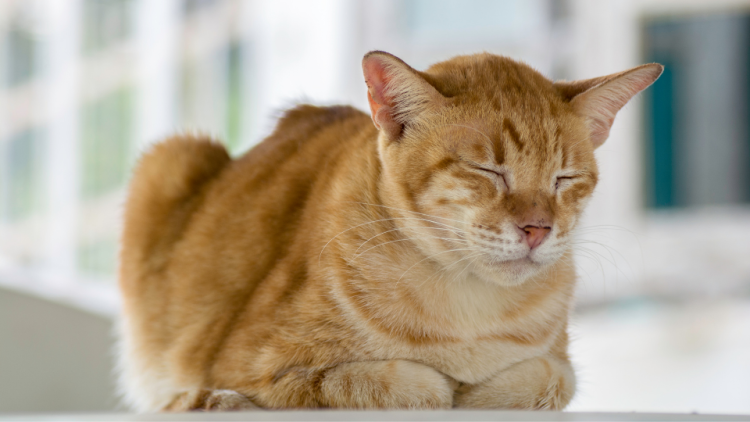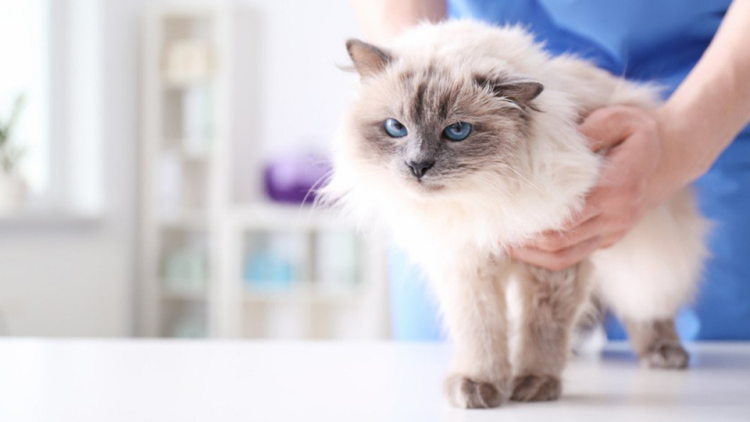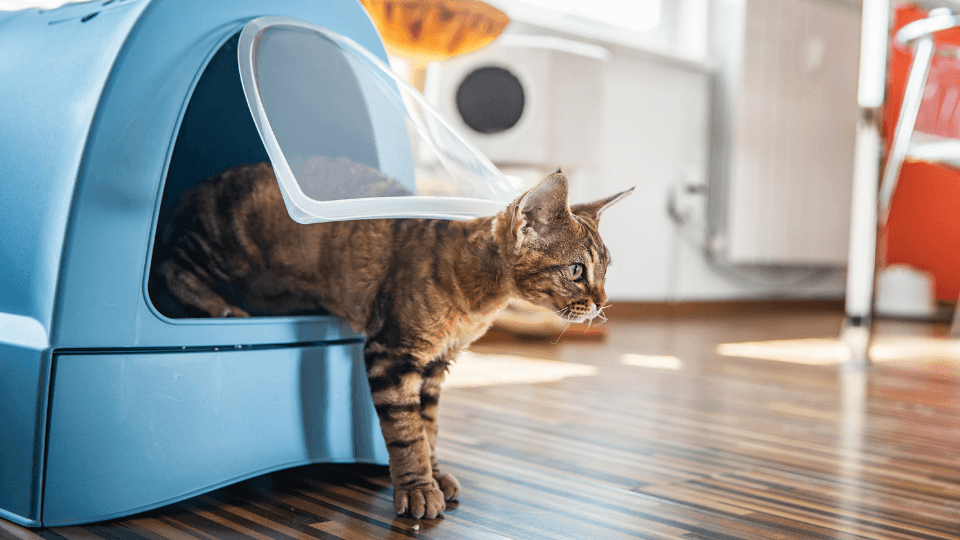Cat diarrhea can be recognized by frequent loose and watery stools. There’s a number of possible causes for diarrhea in cats ranging from simple to complex. In many cases, cat diarrhea can be treated at home but in others, you’ll need to see your vet in order to determine the cause of diarrhea and get appropriate treatment.
Here’s everything you need to know about diarrhea in cats.
Table of Contents:
- Why does my cat have diarrhea?
- What causes diarrhea in cats?
- How long can a cat have diarrhea?
- What to give a cat with diarrhea?
- What home remedy can I give my cat for diarrhea?
- Diarrhea in kittens
- Can you prevent cat diarrhea?
- Key Takeaways
Pro Tip: Vet bills can be costly but keeping your kitty healthy isn’t always possible without assistance from the vet. Having the right pet insurance plan will protect your budget and give you peace of mind knowing your cat’s health is secure.
Why does my cat have diarrhea?
Diarrhea is defined as stool that’s softer/more liquid than usual. There are two main types of diarrhea in cats: acute, which occurs suddenly and lasts for less than two weeks, and chronic diarrhea, which persists or recurs over a period of three weeks or more.
Normal cat poop is generally firm, dark brown, and shaped like nuggets or logs. However, if your feline friend has liquid or soft bowel movements for more than two days, it is important to determine the cause, since diarrhea might be an indication of a serious or even life-threatening disease.
Symptoms of cat diarrhea
In addition to loose and watery stools, if your cat has diarrhea, it might also display the following symptoms:
- Frequent bowel movements
- Defecating outside the litter box
- Straining to defecate
- Blood or mucus in the stool
- Worms in the stool
- Vomiting or nausea
- Decreased appetite
- Weakness or fatigue
- Weight loss
- Abdominal pain

What causes diarrhea in cats?
Diarrhea in cats can be caused by many things but some of the most common causes include:
Parasites
Parasites like hookworms, tapeworms, giardia, and coccidia can irritate the gastrointestinal (GI) tract and cause diarrhea, as well as other symptoms, like vomiting, dehydration, and a dull coat.
Foreign objects
Many kitties like chewing on non-food items like toys and cardboard but if these get accidentally swallowed, they can irritate the GI tract or even get lodged in the intestine, creating an obstruction.
Medications
Some vet-prescribed meds can cause diarrhea as a side effect. The list includes NSAIDs, steroids, bronchodilators, anti-anxiety drugs, and heart medications.
Toxins
Ingestion of poisonous substances can cause diarrhea, as well as other symptoms like vomiting, sluggishness, an unsteady gait, and seizures. Many substances found around the home can be toxic to your cat, including cleaning agents, antifreeze, rodenticides, and insecticides.
Human drugs can also be toxic to cats, as can some plants like tulips, lilies, philodendron, foxglove, and poinsettias.
Food and diet
Cats are obligate carnivores, which means that they get their required nutrients from a diet that is high in protein and low in carbs. High carbohydrate intake in cats can increase colonic and fecal organic acid concentrations and encourage the growth of certain types of bad gut bacteria, resulting in diarrhea, bloating, flatulence, and even inflammatory bowel disease.
A food allergy or intolerance can also trigger diarrhea. The most common symptoms are digestive upset or skin irritation, but you may also notice vomiting.
Another thing that can cause diarrhea is a sudden change in your pet’s diet. Even if your feline companion doesn’t have a sensitive stomach, new foods can upset the GI system at first. For this reason, you should always introduce new types or brands of food gradually, preferably over a period of one to two weeks.
Many human foods can cause diarrhea if consumed in large amounts, and some are even toxic to cats. The list of foods that are toxic to cats includes grapes, raisins, avocado, chocolate, garlic, onions, alcohol, and xylitol. Milk and other dairy products can also be problematic because most adult cats are lactose intolerant.
Certain health conditions
A number of medical conditions in cats can cause chronic diarrhea in cats. Many of them are infections caused by bacteria like Campylobacter and Salmonella, whereas others are viral infections such as feline parvo, leukemia, infectious peritonitis, and immunodeficiency virus.
Other conditions that commonly cause cat diarrhea include:
- Inflammatory bowel disease (IBD)
- Hyperthyroidism
- Liver dysfunction
- Vitamin B12 deficiency
- Pancreatitis
- Lymphoma
Chronic (long-lasting or reccurring) diarrhea can cause serious complications. These cases are often resistant to treatment and can require multiple diagnostic tests before it can be completely resolved, if possible.
How long can a cat have diarrhea?
Contact your vet for their earliest appointment if cat diarrhea persists for more than three dayse --- especially if it's accompanied by other symptoms such as vomiting, lethargy, decreased appetite, bloody, mucous, or discolored stools. These could be clinical signs of an underlying disease that should be promptly addressed.
Occasional loose stools should not be a cause for concern. If your cat has diarrhea but seems fine and does not present other symptoms of illness, it’s advisable to wait a day or two to see if the condition resolves itself. A one-off bout of diarrhea in cats is not a reason to go to the pet emergency room.
However, if you think your pet may have swallowed a foreign object or ingested something toxic, get in touch with your veterinarian or a nearby vet clinic immediately.

Identifying the cause of cat diarrhea
Your vet will likely perform fecal tests that include cytology, fecal flotation, culturing, and antigen testing to check for inflammatory and infectious diseases.
Bloodwork is used to screen for systemic or metabolic causes and check whether the diarrhea has caused anemia or dehydration.
They might also order abdominal ultrasound, endoscopy, or X-rays to check for cancer or possible ingestion of a foreign body.
Other methods to determine the cause of cat diarrhea include gastrointestinal function tests, colonoscopy, biopsy, medication trials, and food trials to assess response to dietary changes.
What to give a cat with diarrhea?
Treatment will depend on what’s causing diarrhea.
In the past, veterinarians would recommend a period of fasting in order to rest the cat’s bowels. However, today we know that the intestines need nutrition to heal themselves, and withholding food is only recommended in case your pet is vomiting.
Dehydrated cats will be given subcutaneous or I.V. fluids. If the diarrhea is caused by parasites, your vet will prescribe a dewormer and other medications. If bacteria is present, the vet will prescribe antibiotics. In some cases, drugs may be given to decrease intestinal motility.
Never give your cat human anti-diarrheal medication, as many of them are toxic to cats.
What home remedy can I give my cat for diarrhea?
Your vet might recommend increasing the intake of fiber as it can lessen or prevent diarrhea by solidifying watery and loose stools. Canned pumpkin and psyllium are two easily available fiber supplements. Although there are no hard rules for how to dose these in cats, it’s best to start with one or two teaspoons of each per day, mixed into your pet's food.
For some cases of diarrhea, permanent diet changes might be necessary to help maintain proper digestion. Your veterinarian could recommend specially-formulated therapeutic cat food or prescribe a highly digestible diet with added prebiotic fibers.
Why does my kitten have diarrhea?
In kittens, diarrhea is usually caused by a parasite or ingested foods they’re not supposed to eat. Kittens love to explore and discover new foods but their digestive system isn’t yet capable of digesting some of these foods. In addition, kittens can dehydrate much quicker than adult cats, which can cause serious issues.
If your kitten has only one instance of diarrhea and seems as lively as usual, there’s probably no reason for concern. However, if diarrhea persists or you notice other symptoms, you should call your vet. The immune system of kittens and senior cats is much weaker than adults, therefore diarrhea can be more dangerous.
Pro Tip: Signing up your kittens for pet insurance as early as possible will make sure they’re fully protected while their immune system is still developing.
Can you prevent cat diarrhea?
Yes, it’s possible to prevent cat diarrhea.
Avoid making abrupt diet changes or feeding your feline friend human foods to prevent cases of stomach upset. Be sure to keep underlying diseases --- like hyperthyroidism, IBD, pancreatitis, and food allergies --- under control with appropriate medications and/or diet, according to your vet’s instructions.
Key Takeaways
- Diarrhea in cats is defined as more frequent bowel movements that are unusually fluid or soft. While diarrhea itself is not a disease, it is an indication that something isn’t right. There are two types of feline diarrhea: acute and chronic.
- There are many possible causes of diarrhea in cats, including parasites, bacterial or viral infections, food allergies, antibiotics, and other medications, etc.
- If diarrhea lasts for several days or is accompanied by other symptoms like vomiting, lethargy, and lack of appetite, be sure to call your vet. Your vet will determine the cause and recommend an appropriate treatment.
